Between legalization in many surrounding states and the increased amount of people with medical use cards, the use of tetrahyocannabinol or THC, has increased dramatically in the past decade.
The surge in popularity of edible cannabis products has allowed users to be discreet, while eliminating odor and potential harm to the lungs. However, the packaging of these products is appealing to children. Most people don’t know, that THC, the principal psychoactive compound found in cannabis, can be extremely toxic to children.
In our communities and at our children’s hospital, there has been an alarming rise of accidental poisonings of children due to synthetic marijuana. It is a growing threat that demands our attention and immediate action. In 2024, we had more than a dozen children brought to our hospital for THC poisoning.
We recently admitted two young children to our pediatric intensive care unit (PICU) on the same day with life threatening consequences from cannabis exposure. Young children who unknowingly ingest THC-laced products often present with significant medical emergencies, including profound lethargy, respiratory depression, seizures, and, in severe cases, coma or even near-cardiac arrest. Nearly 10 percent of children suffering from these ingestions require support in a PICU.
Recent data from the Centers for Disease Control and Prevention (CDC) reveals a dramatic increase in the rate of overdoses. In 2017, there were 207 reported cases of accidental edible cannabis exposure for kids under the age of 6. By 2021, the number skyrocketed to 3,054, and these numbers continue to increase. Toddlers are disproportionately affected due to their small size and developing metabolism, making even small quantities extremely toxic.
In June 2022, the Food and Drug Administration released a consumer alert warning that THC-containing edibles are easily mistaken for products that might appeal to children.
The deliberate packaging strategy of manufactures of cannabis edibles is particularly disturbing, with designs intended to mimic everyday treats like gummy bears, chocolates or cookies. These look-alike products are enticing and accessible, especially for children who are naturally curious and drawn to bright colors and sweet flavors. The packaging and marketing of these products is truly disgraceful. They have turned a blind eye to the safety of our children.
Beyond individual households, community-wide awareness and collaboration are essential to combat this public health issue. Schools, pediatricians and public health organizations can play key roles in educating families about the risks and promoting safe practices. Local authorities should be encouraged to prioritize drug enforcement and the regulation of THC-containing products to protect children.
We cannot afford to take this threat lightly. As pediatricians, caregivers and community members, we must work together to prevent accidental ingestions and safeguard our children’s health. These are not isolated cases; they are preventable tragedies. By taking swift and proactive measures, we can ensure our homes and communities are safe havens for our youngest and most vulnerable members.
Here are some practical steps families can take:
— Do not bring these products into households with small children.
— Store all THC products, medications and household substances high up and locked away. Ensure the storage areas are out of sight and out of reach for curious hands.
— Understand packaging risks: THC products marketed as edibles often come in packaging that closely resembles legitimate snacks. Parents must carefully inspect items brought into the home and, better yet, avoid purchasing look-alike products entirely.
— Advocate for better labeling: As community members, we should support legislation that mandates clear, unmistakable labeling and discourages child-attractive packaging for THC-containing products.
— Act immediately in emergencies: If you suspect your child has ingested something harmful, call 911 and Poison Control (1-800-222-1222) immediately. Time is critical in these cases, and prompt medical attention can save lives.
H/T: www.lockhaven.com



